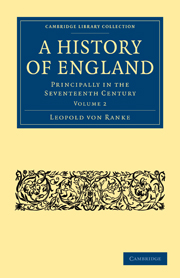Book contents
- Frontmatter
- Contents
- BOOK VI GOVERNMENT IN ENGLAND WITHOUT THE PARLIAMENT. TROUBLES IN SCOTLAND
- BOOK VII CONNEXION BETWEEN THE TROUBLES IN SCOTLAND AND THOSE IN ENGLAND AND ELSEWHERE
- BOOK VIII THE LONG PARLIAMENT AND THE KING, DOWN TO THE OUTBREAK OF THE CIVIL WAR
- BOOK IX THE ENGLISH CIVIL WAR, 1642—1646
- INTRODUCTION
- CHAP. I Origin of the Civil War
- CHAP. II The Campaigns of 1642 and 1643
- CHAP. III Fresh interference of the Scots. Campaign of 1644
- CHAP. IV Preponderance of the Scots. Reconstruction of the English army
- CHAP. V The Campaign of 1645
- BOOK X INDEPENDENTS AND PRESBYTERIANS. FATE OF THE KING
CHAP. IV - Preponderance of the Scots. Reconstruction of the English army
Published online by Cambridge University Press: 07 June 2011
- Frontmatter
- Contents
- BOOK VI GOVERNMENT IN ENGLAND WITHOUT THE PARLIAMENT. TROUBLES IN SCOTLAND
- BOOK VII CONNEXION BETWEEN THE TROUBLES IN SCOTLAND AND THOSE IN ENGLAND AND ELSEWHERE
- BOOK VIII THE LONG PARLIAMENT AND THE KING, DOWN TO THE OUTBREAK OF THE CIVIL WAR
- BOOK IX THE ENGLISH CIVIL WAR, 1642—1646
- INTRODUCTION
- CHAP. I Origin of the Civil War
- CHAP. II The Campaigns of 1642 and 1643
- CHAP. III Fresh interference of the Scots. Campaign of 1644
- CHAP. IV Preponderance of the Scots. Reconstruction of the English army
- CHAP. V The Campaign of 1645
- BOOK X INDEPENDENTS AND PRESBYTERIANS. FATE OF THE KING
Summary
The Scots, there is no doubt, had again contributed decisively to the change of fortune, and therefore a great influence on the course of affairs necessarily fell into their hands. Immediately after the arrival of the Scottish commissioners the Committee of the two kingdoms was established, a body which in fact expressed this relation. Loudon and Warriston had devised the scheme: it was first discussed and shaped in consultation with the younger Vane and Oliver St. John, and then brought before Parliament. The Committee was to direct its attention to the maintenance of a good understanding within the three kingdoms, as well as with foreign powers, and especially in all that related to the war in which they were engaged, not only to advise and consult, but to order and regulate. These words excited vigorous opposition in the Lords: they were unwilling to commit the direction of affairs to a Committee which consisted partly of Scots, and which would deprive Parliament of the ultimate decision, and they also did not wish to place the Earl of Essex, who hitherto had maintained great independence in the command of his army, as was allowed to a general in those days, under the direction of a Committee. The Scots however insisted on their views in a forcible memorial, and were backed by the Lower House. For it was obvious that the war could not be carried on by the two nations in conformity with the single end in view, nor could their forces co-operate, unless they were under a single authority, which was impossible without a Committee of both nations.
- Type
- Chapter
- Information
- A History of EnglandPrincipally in the Seventeenth Century, pp. 405 - 422Publisher: Cambridge University PressPrint publication year: 2010First published in: 1875



